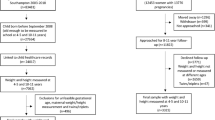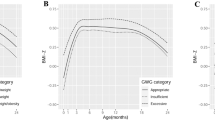Abstract
Background:
Very little is known about the factors influencing parental misclassifications of a child's weight status. The aim of this study is to examine the predictors of maternal misclassifications of their adolescent offspring's weight status.
Methods:
A mother–child linked analysis was carried out using 14-year follow-up data from a population-based prospective birth cohort of 2650 children (52% males) who were participants in the Mater-University Study of Pregnancy in Brisbane (Australia) in 1981. Offspring's observed height and weight and maternal perception of offspring weight were reported when they were 14 years old and predictors were prospectively recorded either at first clinical visit of mothers or at 5 or 14 years follow-up. Maternal misclassifications were defined combining observed body mass index (BMI) categories and maternal perceptions of their offspring's weight status.
Results:
We found that maternal misclassification of child's weight status was common and included misclassifications both to higher and lower weight categories. Forty percent of mothers of overweight children misclassified their child as normal or underweight, more so in males than females. Fifteen percent of mothers of normal weight children misclassified their child as underweight, again more so in males than females. The main independent predictors of maternal misclassifications of child weight status were gender, child dissatisfaction with appearance, shape, size and weight, dieting to lose weight, general health status, maternal BMI and family meals. Gender, child dissatisfaction, dieting and maternal overweight were especially associated with misclassifications of overweight children.
Conclusions:
This study identified a number of maternal, child and family factors associated with maternal misclassifications of child weight status. Although relevant for clinical practice, further study is needed, however, to evaluate the benefits and harms of promoting increasing parental and child awareness of the child's weight status at a population level.
This is a preview of subscription content, access via your institution
Access options
Subscribe to this journal
Receive 12 print issues and online access
$259.00 per year
only $21.58 per issue
Buy this article
- Purchase on Springer Link
- Instant access to full article PDF
Prices may be subject to local taxes which are calculated during checkout
Similar content being viewed by others
References
Mamun AA, Lawlor DA, O'Callaghan M, Williams GM, Najman JM . Family and early life factors associated with changes in overweight status between ages 5 and 14: findings from the Mater University Study of Pregnancy and its outcomes. Int J Obes Relat Metab Disord 2005; 29: 475–482.
Whitaker RC, Wright JA, Pepe MS, Seidel KD, Dietz WH . Predicting obesity in young adulthood from childhood and parental obesity. N Engl J Med 1997; 337: 869–873.
Epstein LH, Valoski A, Wing RR, McCurley J . Ten-year follow-up of behavioural, family-based treatment for obese children. JAMA 1990; 264: 2519–2523.
Baughcum AE, Chamberlin LA, Deeks CM, Powers SW, Whitaker RC . Maternal perceptions of overweight preschool children. Pediatrics 2000; 106: 1380–1386.
Carnell S, Edwards C, Croker H, Boniface D, Wardle J . Parental perceptions of overweight in 3–5 y olds. Int J Obes Relat Metab Disord 2005; 29: 353–355.
Etelson D, Brand DA, Patrick PA, Shirali A . Childhood obesity: do parents recognize this health risk? Obes Res 2003; 11: 1362–1368.
Genovesi S, Giussani M, Faini A, Vigorita F, Pieruzzi F, Strepparava MG et al. Maternal perception of excess weight in children: a survey conducted by paediatricians in the province of Milan. Acta Paediatr 2005; 94: 747–752.
Jeffery AN, Voss LD, Metcalf BS, Alba A, Wilkin TJ . Parent's awareness of overweight in themselves and their children: cross sectional study within a cohort (EarlyBird 21). BMJ 2005; 330: 23–24.
Maynard LM, Galuska DA, Blanck HM, Serdula MK . Maternal perceptions of weight status of children. Pediatrics 2003; 111: 1226–1231.
Campbell MW, Williams J, Hampton A, Wake M . Maternal concern and perceptions of overweight in Australian preschool-aged children. Med J Aust 2006; 184: 274–277.
Eckstein KC, Mikhail LM, Ariza AJ, Thomson JS, Millard SC, Binns HJ . Pediatric Practice Research Group, Parents' perceptions of their child's weight and health. Pediatrics 2006; 117: 681–690.
Wake M, Salmon L, Waters E, Wright M, Hesketh K . Parent-reported health status of overweight and obese Australian primary school children: a cross-sectional population survey. Int J Obes Relat Metab Disord 2005; 29: 351–352.
Genovesi S, Giussani M, Faini A, Vigorita F, Pieruzzi F, Strepparava MG et al. Maternal perception of excess weight in children: a survey conducted by paediatricians in the province of Milan. Acta Paediatr 2005; 94: 747–752.
Jackson J, Strauss CC, Lee AA, Hunter K . Parents' accuracy in estimating child weight status. Addict Behav 1990; 15: 65–68.
Kuczmarski MF, Kuczmarski RJ, Najjar M . Effects of age on validity of self-reported height, weight, and body mass index: findings from the Third National Health and Nutrition Examination Survey, 1988–1994. J Am Diet Assoc 2001; 101: 28–34; quiz 35–36.
Yannakoulia M, Panagiotakos DB, Pitsavos C, Stefanadis C . Correlates of BMI misreporting among apparently healthy individuals: the ATTICA study. Obesity (Silver Spring) 2006; 14: 894–901.
Keeping JD, Najman JM, Morrison J, Western JS, Andersen MJ, Williams GM . A prospective longitudinal study of social, psychological and obstetric factors in pregnancy: response rates and demographic characteristics of the 8556 respondents. Br J Obstet Gynaecol 1989; 96: 289–297.
Lawlor D, Najman JM, Sterne J, Williams GM, Ebrahim S, Davey Smith G . Associations of parental, birth and early life characteristics with systolic blood pressure at age 5: findings from the Mater-University study of pregnancy and its outcomes. Circulation 2004; 110: 2417–2423.
Najman JM, Bor W, O'Callaghan M, Williams GM, Aird R, Shuttlewood G . Cohort profile: the Mater-University of Queensland Study of Pregnancy (MUSP). Int J Epidemiol 2005; 34: 992–997.
Cole TJ, Bellizzi MC, Flegal KM, Dietz WH . Establishing a standard definition for child overweight and obesity worldwide: international survey. BMJ 2000; 320: 1240–1243.
World Health Organization. Obesity. Preventing and Managing the Global Epidemic. Report of a WHO Consultation on Obesity, 3–5 June 1997 World health Organization: Geneva, Switzerland, 1998.
Bedford A, Foulds G A . Delusions Symptoms States Inventory: State of Anxiety and Depression (Manual). NFER Publishing: Berkshire, England, 1978.
Achenbach TM . Integrative Guide for the 1991 CBCL/4–18, YSR, and TRF Profiles. University of Vermont Department of Psychiatry: Burlington, VT, 1991.
Wurtman RJ, Wurtman JJ . Brain serotonin, carbohydrate-craving, obesity and depression. Adv Exp Med Biol 1996; 398: 35–41.
Leyland AH, Goldstein H .(eds). Multilevel Modelling of Health Statistics. Wiley: Chichester, NY, c2001.
Hogan JW, Roy J, Korkontzelou C . Handling drop-out in longitudinal studies. Stat Med 2004; 23: 1455–1497.
Baur LA . Childhood obesity: practically invisible. Int J Obes Relat Metab Disord 2005; 29: 351–352.
Prochaska JO, DiClemente CC . Transtheoretical therapy: toward a more integrative model of change. Psychother Theory Res Pract 1982; 19: 276–288.
Golan M, Weizman A, Apter A, Fainaru M . Parents as the exclusive agents of change in the treatment of childhood obesity. Am J Clin Nutr 1998; 67: 1130–1135.
Golan M, Crow S . Targeting parents exclusively in the treatment of childhood obesity: long-term results. Obes Res 2004; 12: 357–361.
Acknowledgements
We are grateful to all participants in the study. Greg Shuttlewood, University of Queensland, helped with data management for the study. The core study was funded by the National Health and Medical Research Council (NHMRC) of Australia. This work was funded by the NHMRC (Grant number 252834) and carried out at the University of Queensland and The Mater Hospital. The views expressed in the paper are those of the authors and not necessarily those of any funding body.
Author information
Authors and Affiliations
Corresponding author
Rights and permissions
About this article
Cite this article
Mamun, A., McDermott, B., O'Callaghan, M. et al. Predictors of maternal misclassifications of their offspring's weight status: a longitudinal study. Int J Obes 32, 48–54 (2008). https://doi.org/10.1038/sj.ijo.0803757
Received:
Revised:
Accepted:
Published:
Issue Date:
DOI: https://doi.org/10.1038/sj.ijo.0803757
Keywords
This article is cited by
-
Accuracy of Syrain Refugee Mothers’ Perceptions of Newborn’s Birth Size: Insights from a National Survey in Turkey
Journal of Immigrant and Minority Health (2023)
-
Parental Perception of Body Weight Status of Their 8-year-old Children: Findings from the European CHOP Study
Maternal and Child Health Journal (2022)
-
Perception of Child Weight and Feeding Styles in Parents of Chinese-American Preschoolers
Journal of Immigrant and Minority Health (2017)
-
Parental perception of child’s weight status and subsequent BMIz change: the KOALA birth cohort study
BMC Public Health (2014)
-
Parental Misperceptions of Children’s Underweight Status: A Meta-analysis
Annals of Behavioral Medicine (2014)



